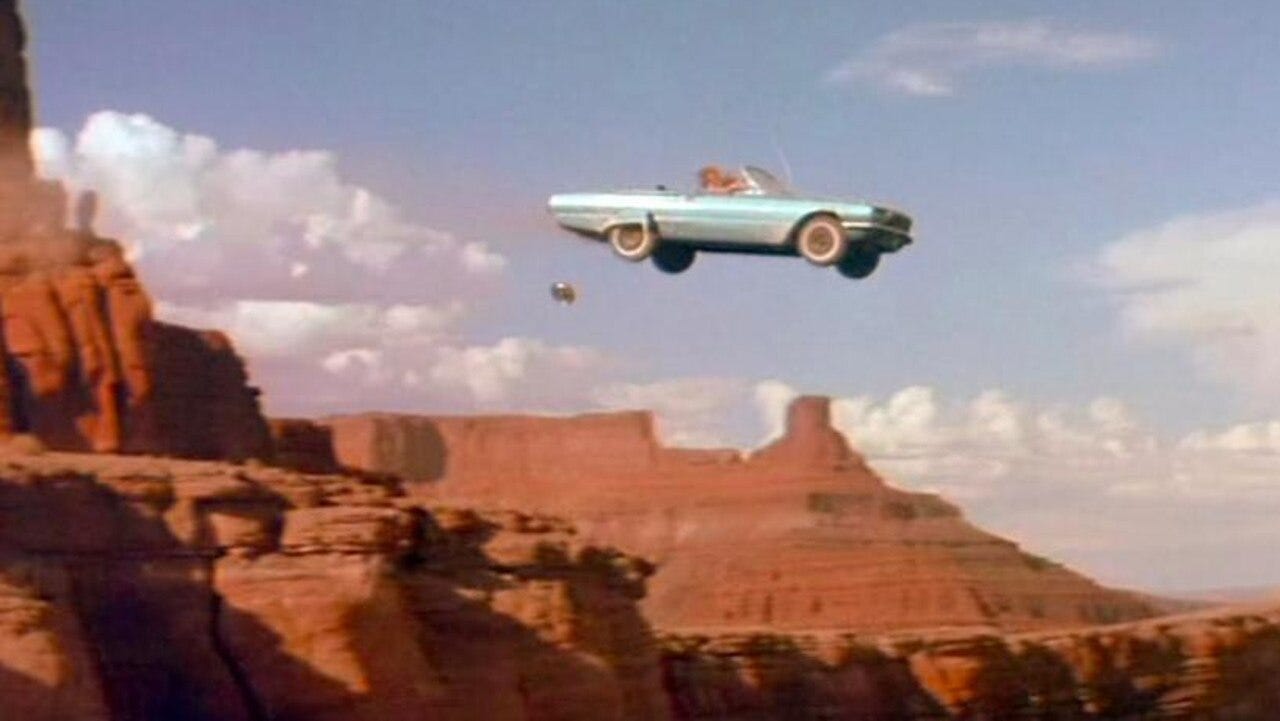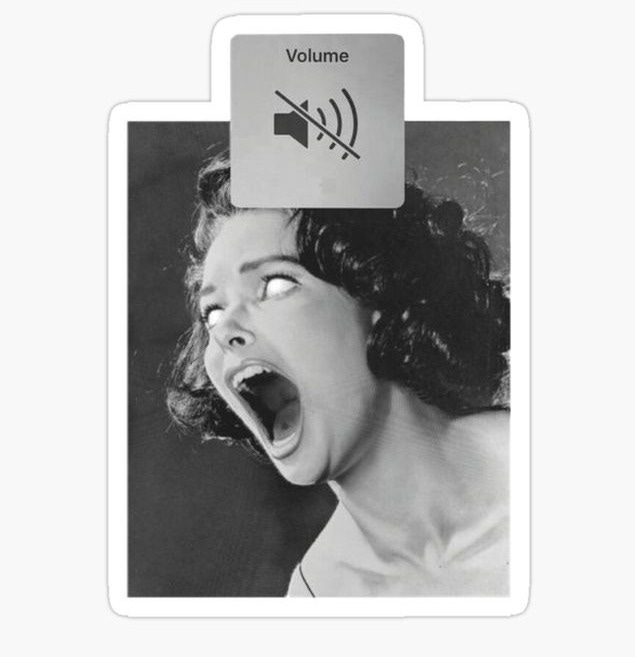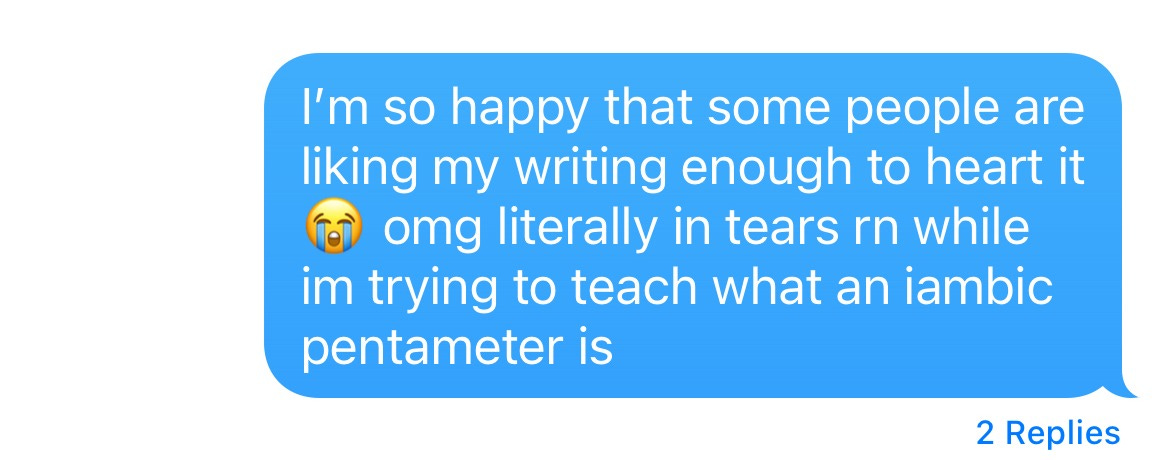Once the backbone of critical engagement with the media we consume, media literacy now feels like it’s on life support—if not fully buried under an avalanche of clickbait, misinformation, and algorithm-driven content. I thought it was bad growing up during the “just Google it” age, but as society always manages to outdo itself, the current “just use ChatGPT” mindset is so much worse. At least with Google, there was a semblance of effort: sifting through search results, evaluating sources, and piecing together information to paraphrase for your paper that was due in the next hour. Now, the expectation is instant answers with zero context, no critical thinking, and a growing dependency on AI to do the heavy lifting. It’s not just a shortcut—it’s an exit ramp off the highway of media literacy.
thelma & louise
I have been teaching English, more specifically the study of Language & Literature, to high school students for the past four years, and I can say that it has given me full-blown anxiety attacks witnessing the rapid deterioration of media literacy. It’s not simply the fact that they don’t know—it’s that they don’t even realize they don’t know. The lack of awareness about credible sources, the inability to differentiate between opinion and fact, and the blind trust in algorithms have created a perfect storm of misinformation and passivity. Many students no longer question the information they consume, nor do they feel the need to dig deeper. Instead, they accept surface-level answers, often generated by AI or curated by algorithms, as absolute truth without considering context, bias, or accuracy.
This isn’t even about the level of education either, as almost all my students are in private schools and should theoretically have access to some of the best resources and teaching available. Yet, I find myself working with seniors who struggle to extract the purpose of a text or identify its target audience, which are fundamental skills for any form of media analysis. These are students on the verge of entering university, yet many of them find it difficult to engage with texts beyond surface-level comprehension. They may excel in memorization or standardized test-taking, but when it comes to critical thinking; asking why a text exists, who it is meant for, and how it seeks to influence its audience, there is a noticeable gap.
There is no doubt media literacy is dying, and as an educator I feel hopeless.
I also want to emphasize that in no way is this a reflection of my students’ intelligence but rather a symptom of what capitalism has been racing toward throughout history: the prioritization of efficiency and profit over critical thinking and education. We’ve normalized passive consumption, reinforcing a cycle where media is something to scroll past, not something to interrogate. What’s most disheartening is that this is a reflection of a system that has devalued critical thinking in favor of immediacy and surface-level engagement. As an educator, I do my absolute best to equip my students with the tools to think deeply and independently, but I can’t help but feel like the toolbox gets left behind after the finals are over.
This isn’t just an educational crisis; it’s a societal one.
Media literacy used to be about teaching people how to discern credible sources, evaluate biases, and critically analyze the content they consume. But in today’s fast-paced digital world, these skills are being replaced by shortcuts. Why critically evaluate a news article when a trending tweet condenses it into 280 characters? Why check the credibility of a source when ChatGPT can provide an answer in seconds?
The system doesn’t incentivize the continued use of these tools. We’ve built a culture that rewards speed over depth, where intellectual shortcuts are normalized and even celebrated. People shouldn’t be commenting, “Is this real or AI?” on every piece of content they encounter, they shouldn’t be wondering why The Odyssey is a classic, and they certainly shouldn’t be questioning why chapter books “are extremely lengthy.” These aren’t isolated instances of ignorance but rather symptoms of a society that has systematically deprioritized critical thinking, analysis, and context in favor of convenience.
And despite the despaired cries from educators globally, it seems like people aren’t understanding how truly scary this is. Media literacy impacts who we vote for, how we understand world events, and the decisions we make in our daily lives. Without the ability to critically evaluate information, we’re left vulnerable to manipulation by misinformation, propaganda, and bad actors who exploit our inability to question what we consume. We are currently losing our ability to actively participate in shaping the society we live in.
It’s time to reopen the schools—not just the buildings, but the classrooms of thought where critical thinking is prioritized over rote memorization and test scores.
Media literacy is not dead yet, but it’s certainly on life support. If we want to revive it, we need to act now. This is not just about saving education—it’s about saving democracy, cultural understanding, and our ability to make informed decisions in an increasingly complex world. Reopening the schools to media literacy means equipping future generations with the tools to navigate the digital age intelligently and thoughtfully. It means giving them the power to sift through the noise and find the truth. Most importantly, it means reminding them and ourselves that critical thinking is not a luxury; it’s a necessity.
It’s time to dust off the toolbox of critical thinking and give media literacy the second chance it desperately needs. Because when it’s gone, the consequences will be streamed for all to see.
Hey guys, I want to thank each one of you for showing me so much support and love for my first post! It was my first time ever publishing any of my essays publicly, and it took me a long time to muster the courage to put myself out there. Knowing that my words have resonated with you means the world to me. I’m so thankful for every view, like, and subscription—it genuinely motivates me to keep sharing more of my writing.
I’m fairly new to Substack and still figuring things out, but I’m loving the process so far. If you have any questions, suggestions, or even just want to chat, feel free to drop by. I’d love to hear from you and connect with you all as I continue this journey!








i still haven't reconciled that viral tik-tok where some girl complains about a book having Too Many Words. praise your contribution <3
"It’s not simply the fact that they don’t know—it’s that they don’t even realize they don’t know. The lack of awareness about credible sources, the inability to differentiate between opinion and fact, and the blind trust in algorithms have created a perfect storm of misinformation and passivity." OH GOD YEESSSS!!! It is disheatening to see.